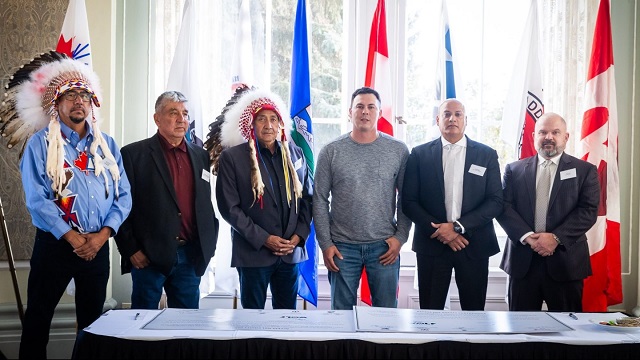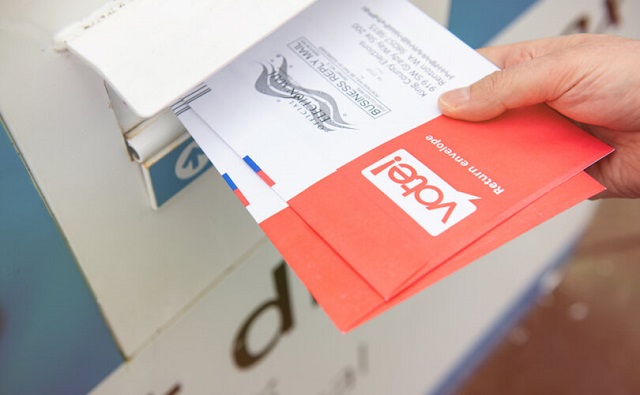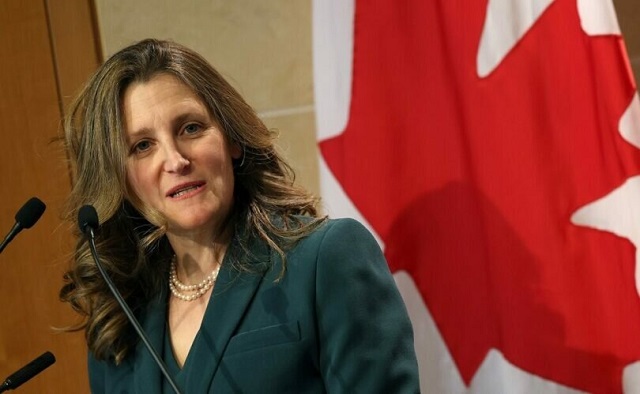Alberta
Indigenous leaders see progress in 2023 but continue to advocate for national loan guarantee program

Wolf Midstream and its partners in the Northern Lakeland Indigenous Alliance participate in a signing ceremony celebrating a $103 million loan guarantee from the AIOC to obtain a 43% stake in the Access NGL Pipeline System. Photo courtesy AIOC
From the Canadian Energy Centre
By Shawn Logan
“Things are starting to work but self-determination is the ultimate goal.”
When John Desjarlais reflects on 2023, he admits he had feared a growing national tide of Indigenous investment in key energy projects was due to hit a speedbump.
Instead, as a new year approaches, the executive director of the Indigenous Resource Network (IRN) says any doubts have been replaced by optimism that the positive momentum of the last few years will flow into 2024.
“I’m feeling more optimistic now. I’m pleased to see the level of conversation being had with Indigenous leaders,” he said.
“I think there is growing opportunity for Indigenous participation across entire value chains, for board and executive positions, and more meaningful involvement. I think we’re really going to see the needle move in 2024.”
 John Desjarlais, executive director of the Indigenous Resource Network in Bragg Creek, Alta. Photo by Dave Chidley for the Canadian Energy Centre
John Desjarlais, executive director of the Indigenous Resource Network in Bragg Creek, Alta. Photo by Dave Chidley for the Canadian Energy Centre
Despite the year’s slow start, Desjarlais said 2023 became something of a bellwether for how the rest of the world views the involvement of First Nations and Métis in Canada’s oil and gas industry.
In April, Desjarlais joined a delegation of Indigenous leaders in Ottawa to meet face-to-face with diplomats from some of the world’s strongest economies. Joined by Haisla Nation Chief Councillor Crystal Smith, First Nations LNG Alliance CEO Karen Ogen and former Enoch Cree First Nation chief Billy Morin, the delegation quickly learned not only was there an appetite for Canadian energy, but for Indigenous knowledge and participation on the critical file.
“Every official had a real desire to really understand Indigenous sentiment around resource development. There was a sincere desire to learn from our perspective,” Desjarlais told the CEC following the meetings with representatives from G7 allies Germany, France, Japan and the United States, as well as Poland and India.
However, while potential international energy partners are intrigued by the potential of relationships with Indigenous energy suppliers, a significant hurdle remains – the need for a national loan guarantee program that would empower more Indigenous ownership in community-transforming projects, particularly oil and gas.
Dale Swampy, president of the National Coalition of Chiefs, is a veteran in the fight for First Nations and Métis to fully benefit from critical resources to directly benefit communities. And he is hopeful there is growing recognition in Ottawa that enabling self-determination is an effective and enduring pathway to prosperity.
“The only way to defeat on-reserve poverty is to create ways to employ people,” he said.
“And the only industry that gives us this opportunity is the natural resources industry.”
Alberta has been a leader in helping open doors to indigenous ownership of major resource projects, launching the Alberta Indigenous Opportunities Corporation (AIOC) in 2019. As the year came to a close, the AIOC announced two more major deals, which will see the total investment backed by the fund to date reach more than $680 million, directly impacting 42 Indigenous groups.
 Dale Swampy President National Coalition of Chiefs. Canadian Energy Centre photo
Dale Swampy President National Coalition of Chiefs. Canadian Energy Centre photo
In what marks the second-largest loan guarantee backed by the provincial corporation, 12 Indigenous communities will invest $150 million to obtain 85 per cent ownership in oil and gas midstream infrastructure in the Marten Hills and Nipisi areas of the Clearwater play in Northern Alberta.
While the ink was still drying, two days later another deal saw five First Nations in northwestern Alberta enter into a $20.5 million partnership with NuVista Energy Ltd. for majority ownership of an emissions-reducing cogeneration unit at the Wembley gas plant in the County of Grande Prairie.
The AIOC’s success saw the Alberta government increase its loan guarantee capacity to $2 billion this year, and it’s set to increase it further to $3 billion for the 2024-2025 fiscal year.
Desjarlais’ IRN spent most of 2023 advocating for a federal version of the AIOC, to emulate its success at the national level.
 Chief Greg Desjarlais of Frog Lake First Nation signs a historic agreement between Enbridge and 23 First Nation and Métis communities in September 2022. The communities acquired, collectively, an 11.57% non-operating interest in seven Enbridge-operated pipelines in the Athabasca region of northern Alberta for $1.12 billion on September 22, 2022. Photo courtesy Enbridge
Chief Greg Desjarlais of Frog Lake First Nation signs a historic agreement between Enbridge and 23 First Nation and Métis communities in September 2022. The communities acquired, collectively, an 11.57% non-operating interest in seven Enbridge-operated pipelines in the Athabasca region of northern Alberta for $1.12 billion on September 22, 2022. Photo courtesy Enbridge
In its fall financial update, the federal government announced it would unveil a new Indigenous loan guarantee program when it sets its 2024 budget this spring. But there has been no commitment to include oil and gas projects as part of the program.
Desjarlais said the fact a program has been promised is a good first step – now Indigenous leaders need to convince the federal government that imposing restrictions will only impede economic reconciliation.
“It looks like there is a program coming but we have to take a look at the exclusions,” he said.
“What we really want to see is less paternalism. Things are starting to work but self-determination is the ultimate goal.”
Desjarlais said the last few years have seen significant progress when it comes to Indigenous involvement in resource projects.
On the west coast, Indigenous-owned Cedar LNG and Ksi Lisims LNG will be at the vanguard of Canada’s first significant foray into exporting the in-demand fuel for customers in Asia. While several Indigenous communities across western Canada are investing in critical infrastructure like pipelines and carbon capture and storage projects.
For Swampy, that progress is long overdue. And it’s becoming increasingly clear that Indigenous communities no longer want to be reliant on government supports – they want to take control of their own destinies.
“They want to take part in the prosperity that comes with oil and gas, and they want to own it,” he said.
“All we ask is that we be involved when it comes to the question about land and resources. We don’t want to just be part of these consultations, we want to lead projects.”
Alberta
Principal at Calgary Elementary School charged with possession of child pornography

News release from the Alberta Law Enforcement Response Team (ALERT)
Calgary school principal charged
A Calgary school principal has been charged with offences relating to child sexual abuse materials following an investigation by ALERT’s Internet Child Exploitation unit.
ICE charged Bruce Campbell on April 16, 2024 with possessing and accessing child pornography. The 61-year-old man was employed as a principal at Sacred Heart Elementary School in Calgary.
“Currently we believe these offences are solely related to online activities, but can appreciate how parents and students would be shocked and concerned about these charges,” said Staff Sergeant Mark Auger, ALERT ICE.
Campbell allegedly uploaded child sexual abuse materials via Skype and ALERT was notified via the RCMP’s National Child Exploitation Crime Centre in January 2024.
Campbell’s Calgary home was searched and a number of phone and computers were seized. A preliminary forensic analysis of the seized devices found child sexual abuse materials on his work-issued cellphone.
While the investigation and charges are related to online offences, the nature of Campbell’s employment placed him in a position of trust and authority. ICE is encouraging anyone with information about this case to come forward and contact police. Anyone with information is encouraged to contact local police or Crime Stoppers (1-800-222-TIPS).
Campbell was released from custody on a number of court-imposed conditions, and is awaiting his next scheduled court appearance on May 10, 2024 in Calgary.
ALERT was established and is funded by the Alberta Government and is a compilation of the province’s most sophisticated law enforcement resources committed to tackling serious and organized crime.
Alberta
Former senior financial advisor charged with embezzling millions from Red Deer area residents

News release from Alberta RCMP
Former senior financial advisor charged for misappropriating nearly $5 million from clients
On April 4, 2024, the RCMP’s Provincial Financial Crime Team charged a Calgary resident for fraud-related offences after embezzling millions of dollars from his clients while serving as a senior financial advisor.
Following a thorough investigation, the accused is alleged to have fraudulently withdrawn funds from client accounts and deposited them into bank accounts he personally controlled. A total of sixteen victims were identified in the Red Deer area and suffered a combined loss of nearly $5 million.
Marc St. Pierre, 52, a resident of Calgary, was arrested and charged with:
- Fraud over $5,000 contrary to section 380(1)(a) of the Criminal Code; and,
- Theft over $5,000 contrary to section 344(a) of the Criminal Code.
St. Pierre is scheduled to appear in Red Deer Provincial Court on May 14, 2024.
“The ability for financial advisors to leverage their position to conduct frauds and investment scams represents a significant risk to the integrity of Alberta’s financial institutions. The investigation serves as an important reminder for all banking clients to regularly check their accounts for any suspicious activity and to report it to their bank’s fraud prevention team.”
- Sgt. John Lamming, Provincial Financial Crime Team
The Provincial Financial Crime Team is a specialized unit that conducts investigations relating to multi-jurisdictional serious fraud, investments scams and corruption.
-

 espionage2 days ago
espionage2 days agoOne in five mail-in voters admitted to committing voter fraud during 2020 election: Rasmussen poll
-

 Business2 days ago
Business2 days agoHonda deal latest episode of corporate welfare in Ontario
-

 Automotive1 day ago
Automotive1 day agoThe EV ‘Bloodbath’ Arrives Early
-

 CBDC Central Bank Digital Currency1 day ago
CBDC Central Bank Digital Currency1 day agoA Fed-Controlled Digital Dollar Could Mean The End Of Freedom
-

 Brownstone Institute1 day ago
Brownstone Institute1 day agoThe Numbers Favour Our Side
-

 Frontier Centre for Public Policy21 hours ago
Frontier Centre for Public Policy21 hours agoHow much do today’s immigrants help Canada?
-

 Bruce Dowbiggin5 mins ago
Bruce Dowbiggin5 mins agoIn Toronto The Leafs Always Fall In Spring: 2024 Edition








